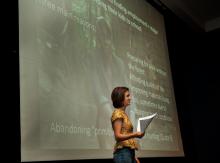Guest Speaker Tucker Shares Experience with Rare Tribe

 On September 14, Georgetown graduate (and daughter of John Tucker, Greenhills math teacher 1968-86), Sarah Tucker presented her first-hand findings on Cameroon’s Bakola Bayeli (one of the last surviving hunting and gathering cultures) to all 9th graders. Below, Anna Krauss ’15 writes about Tucker’s engaging presentation.
On September 14, Georgetown graduate (and daughter of John Tucker, Greenhills math teacher 1968-86), Sarah Tucker presented her first-hand findings on Cameroon’s Bakola Bayeli (one of the last surviving hunting and gathering cultures) to all 9th graders. Below, Anna Krauss ’15 writes about Tucker’s engaging presentation.
“Over this past year, Sarah Tucker, a Georgetown University graduate, went to Cameroon to visit one of the last surviving hunting and gathering groups, the Bakola Bagyeli. This group is exceptionally isolated and virtually the only other human contact they have is with the Bantu, who have been taking advantage of the Bakola Bagyeli.
 The Bakola Bagyeli have been experiencing many profound challenges. First, there is poverty, which isn’t really in the way we think of it. They have more problems finding plants and animals because of deforestation and also they havve a need for manufactured goods, but they are not employed in a way that they can get money. Second, because of their isolation, they have limited access to social services. This includes health care, which is a major problem if there is any illness because sometimes their traditional remedies do not suffice for modern medicine. Third, their forest resources are diminishing from deforestation and mining. Since they are nomadic, they leave no trace so there is no physical evidence of them ever “owning” that part of the forest, and they have no deeds to the land. So the Bantu have been selling tohe Bakola Bagyeli’s land to get money from mining companies. Fourth, they do not have reliable representation in the government; the representatives they have had have taken advantage of them.
The Bakola Bagyeli have been experiencing many profound challenges. First, there is poverty, which isn’t really in the way we think of it. They have more problems finding plants and animals because of deforestation and also they havve a need for manufactured goods, but they are not employed in a way that they can get money. Second, because of their isolation, they have limited access to social services. This includes health care, which is a major problem if there is any illness because sometimes their traditional remedies do not suffice for modern medicine. Third, their forest resources are diminishing from deforestation and mining. Since they are nomadic, they leave no trace so there is no physical evidence of them ever “owning” that part of the forest, and they have no deeds to the land. So the Bantu have been selling tohe Bakola Bagyeli’s land to get money from mining companies. Fourth, they do not have reliable representation in the government; the representatives they have had have taken advantage of them.
 But this is not all to say that their situation is hopeless. Tucker said that there is one main solution: integration, not assimilation. This means that they would still become more of a part of societies without having to change their traditional ways. Education is a key factor in this. Through education they can learn the rights of citizens, lnguage and literacy skills, and access to vital information such as information on HIV/AIDS. They would also need a political platform, and someone willing and able to defend it. Some even say they should get jobs to support themselves in case of total deforestation or loss of land. There are some problems with education, such as lack of materials, the children needing to spend a great deal oftime to help sustain their families, and the fact that these children aren’t used to this type of life style and usually learn through activity. There are solutions t this too, such as boarding school and giving materials to them. There are also two pilot programs. The first is to have a cultural pride-type school wit a bit different teaching methods with teachers trained from the tribe because they would fully understand the children’s needs. Second, there is a program to give a hunting dog to the families who have school-aged children so they can have extra hunting help.
But this is not all to say that their situation is hopeless. Tucker said that there is one main solution: integration, not assimilation. This means that they would still become more of a part of societies without having to change their traditional ways. Education is a key factor in this. Through education they can learn the rights of citizens, lnguage and literacy skills, and access to vital information such as information on HIV/AIDS. They would also need a political platform, and someone willing and able to defend it. Some even say they should get jobs to support themselves in case of total deforestation or loss of land. There are some problems with education, such as lack of materials, the children needing to spend a great deal oftime to help sustain their families, and the fact that these children aren’t used to this type of life style and usually learn through activity. There are solutions t this too, such as boarding school and giving materials to them. There are also two pilot programs. The first is to have a cultural pride-type school wit a bit different teaching methods with teachers trained from the tribe because they would fully understand the children’s needs. Second, there is a program to give a hunting dog to the families who have school-aged children so they can have extra hunting help.
The Bakola Bagyeli are an amazing people, and we must make sure that they don’t disappear. With help from those like Sarah Tucker, this is made possible.”





